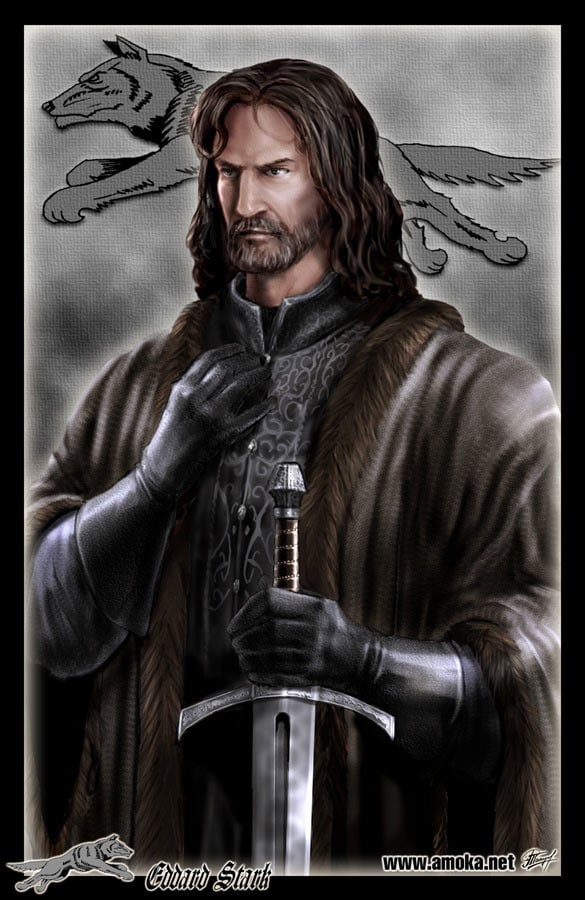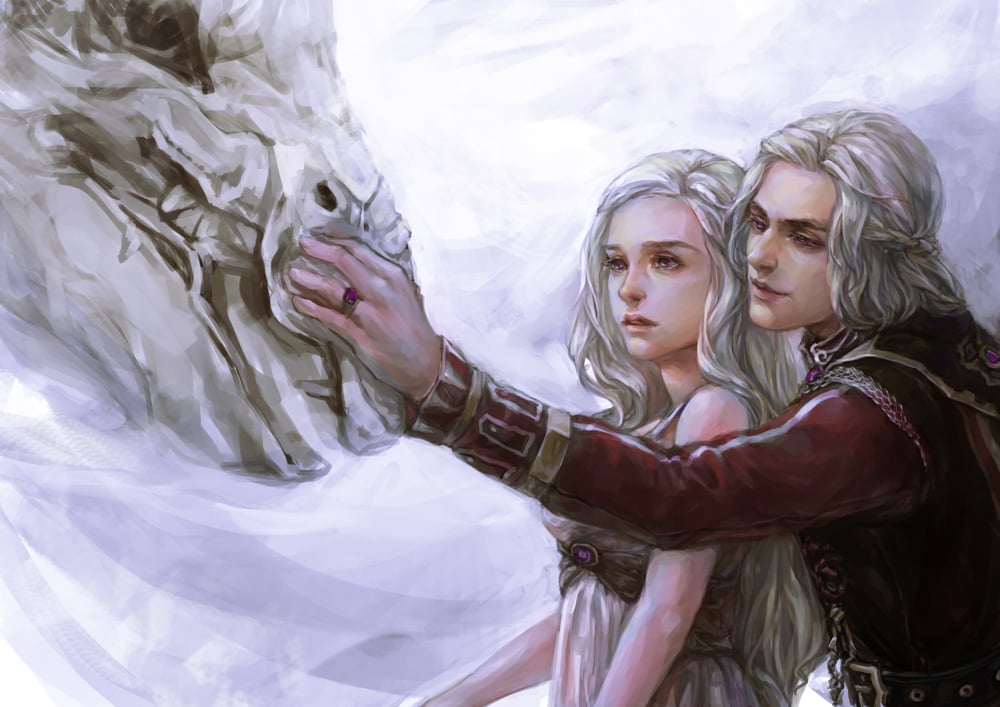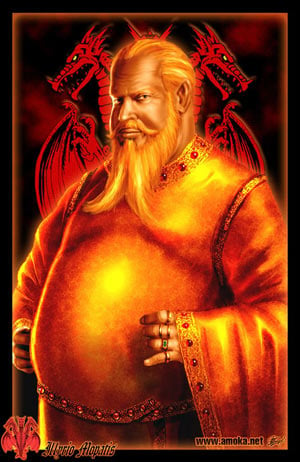Synopsis: Here we finally get a look inside the head of the Lord of Winterfell himself. This is Eddard's first chapter and don't worry, we'll be having a look at him for a long time to come. Here we are introduced to a whole host of characters Lannister and all, we also finally get a look at King Robert Baratheon. Robert makes some courtesy calls, visits the grave of his dead love, and against Ned Starks wishes appoints him Hand of the King.
What do we learn?:
Culture:
Well I can't say we learn much more culturally here than we did in other chapters but there are some interesting insights. On the one hand we have yet another look at just how different the North is from the many Southern realms, what with Ned's talk of little humor in the North and his dutiful attitude and talk of honor.
We also see some of the ancient glory of House Stark. There is a great crypt beneath Winterfell where all the Lords (and Kings) of Winter lay to rest. Clearly these are old crypts which stretch back hundreds of years as we see some of the earliest Kings of Winter sitting on their thrones with swords in hand and wolves at their feet. It's interesting that they have the iron swords placed upon their graves in order to keep their spirits locked inside (Which Ned humorously reflects is a good thing since the original lords of Winterfell were harsh men who styled themselves King in the North, which implied they were the ones who conquered all the North quite brutally).
The description of the South in summer is also one which is in stark comparison to the North, one of ripe harvests, rich wines, lush fields, and bustling trade and economy. The North on the other hand is subject to summer snows, vast empty territories, and a dour and serious people who do what they have to in order to survive.
All in all rather cheerful.
As an extra note I'm mildly amused to discover I had forgotten that phrases like "The Others take him" are considered swear words or curses. It really goes to show how the supposedly legendary threat of the Others really pervades the culture of Westeros, and for all the men of the modern day scoff at the idea of them existing, the cultural memory of the Others and their invasion is deeply ingrained into the Westerosi psyche.
Political:
Thankfully unlike the last chapter, this one is fairly meaty with some lovely political details, especially in light of the death of Jon Arryn.
I haven't talked much about the Warden system of Westeros (outside my one essay of course) but here I might as well bring it up since it is an important point. The title of Warden is purely military and even as Ned points out "In peace the title is only an honor." However we also learn that it is one which is almost hereditary, and removing that title would evidently be something which might offer an affront to a noble house "the title comes with the domain" suggesting that is has been centuries since the honor/duties of Warden were transferred from a Great House. It's even a part of Ned's official title.
Here though we see that Robert has a practical reason for considering shifting the title away from Robert Arryn, even though he is the head (in name at least) of House Arryn he is only a child, six and sickly to quote Robert directly, and a sickly child is no war leader so now he must find someone suitable to hold the title.
This could be a mild political affront to a House with as much history and honor as the Arryn's so Ned is probably right to suggest Robert tread carefully, but Robert's practical concern of potential invasions and potential internal turmoil (not to mention the mountain clans which seem to eternally plague the Vale) are quite valid and actually shows some good forethought for ruling on his part, as much as he complains about having to do it.
Mind you Lysa Arryn's flight from Kings Landing in the middle of the night may have irked Robert, and this is a man not above being petty, but here I think his concern is much more practical.
However, Robert also has a much more important position to fill, that of the Hand of the King. The Handship is a rather difficult office to explain but we have Ned lay out the full authority of the Hand in this chapter:
"The Hand of the King was the second-most powerful man in the Seven Kingdoms. He spoke with the king’s voice, commanded the king’s armies, drafted the king’s laws. Robert was offering him a responsibility as large as the realm itself."This is a handy way to get a feel for the power of the Hand and what his duties are. Though as Robert points out, he is merely just giving the job of ruling the realm to Ned.
It's hard to define exactly what the Hand is, it's a very original office which seems to combine the roles of First Councilor and Prime Minister into a single office. He is given charge over the Small Council, given command of the King's Laws, and given control over the very power the King can wield himself (and it is implied only the king could overrule him if he made a proclamation). This is quite a prestigious honor and one which easily makes Ned one of the most powerful men in the Seven Kingdoms and easily enforces the Stark-Baratheon alliance, to say nothing of helping keep the Tullys and Arryn's in line. Couple this with Robert's marriage to Cersei Lannister which adds the wealthy and powerful House Lannister into the mix and you have a dynasty which should truly be able to stand the test of the centuries.
Ned's appointment should of course simply seal the Baratheon kingship into its new mantle as overlords of Westeros, but as we all know that isn't quite what happens.
Politically we also get a good look at the system of fostering which is prevalent throughout Westeros. We learn both Robert and Ned were fostered at the Eyrie under Jon Arryn and that Robert had plans to foster Robert Arryn at Casterly Rock in order to help cement cooperation between the Great Houses. Fostering is of course a valuable tool since it shows your trust in a fellow lord and how it can create great bonds between future heirs or members of the Great Houses.
Of course we also see the flip side where a ward can easily become a hostage, as is the case with Theon Greyjoy, who was taken in the aftermath of the failed Greyjoy Rebellion.
Character:
We get a good look here at the inner workings of both Ned Stark and Robert Baratheon, both two of the most powerful men in the Seven Kingdoms.
 |
| Credit to Amoka |
First off let's take a look inside the head of the Lord of Winterfell. As shown previously Ned is an honorable man with a deep sense of duty to his people, his family, and his king. Seeing his interaction with Robert here is what truly shows us just how dutiful a man Eddard really is. He says things because it is expected of him and he treats Robert with the proper deference and distance as expected from a vassal to a liege lord.
Building up on this we really see that it isn't a face Ned puts on and he really is as honorable and family oriented as others make him out to be. We also see where these traits can be a fault. Rather than truly arguing with Robert he tries to humor his king, and rather than voicing any immediate doubts he goes to humor the man who he would be better off talking to purely as a friend.
However, he also seems to have a deep seeded, almost instinctual, distrust of the Lannisters after having dealt with Tywin's casual betrayal of Aerys during the rebellion, and Jaime's kingslaying. Then of course there is the matter of Tywin having the Targaryen heirs he could lay his hands on butchered by his knights. This leads to Ned's internal monologue mistrusting Tywin and thinking about how he'd rather trust a child with a pit viper.
While maybe not a major character flaw for mistrusting all things Lannister, it does mean he can take things a little too far in that mistrust as we will see later.
Now for our good friend and the King of the Seven Kingdoms, Robert Baratheon.
Despite what many say about Robert being a bad king (and believe me, he isn't a good one) he actually acquits himself well here, he is well aware of the practical military realities and even some of the political problems facing his rule (something he does consistently show) but I think what I said above is true above all. Robert is well aware of the military problems the kingdom faces, but he is not incredibly astute at the art of politics.
Sure his cheerful and amiable personality wins him fast friends and even cows some of his enemies, but he is not well suited to playing the game of thrones. Truly it was Jon Arryn who ran the kingdom despite the troubles placed upon it by Robert.
Here though we see that yes Robert is practical, but for all that he is stuck in the past. He spurns his queen (the link to an incredibly powerful house) and immediately goes to visit the grave of his long lost dead love, and while he is there he speaks angrily of killing Rhaegar at the Battle of the Trident. He speaks contemptuously of his time on the throne, and seems to detest it as much as any man can detest a job.
 |
| Credit to Abe Papakhian |
However, that being said the man is self-aware of his problems, but he chooses to do nothing about it. He knows he is a poor king but he flits between hating the job and doing it with alarming regularity, one minute with Ned he is all chummy and contemptuous of the throne, the next he is using his power like a weapon to bully Ned into seeing things his way. Robert is clearly a man who doesn't quite know what to do with the power he wields, and as time will show, is clearly one who never wanted it in the first place.
History:
Well I could offer you a historical analysis about fostering, wards and hostages, but I think I can speak more about that later. For now let's talk about something from Westeros's history which I think demonstrates just how decent Robert was as king.
This of course all relates back to Eddard's ward, Theon Greyjoy.
I am of course referring to the Greyjoy Rebellion which is mentioned in this chapter and I'm hoping to use it to underscore a point about Robert's personality.
First some background for those who are unaware of the whole story here. The Greyjoy Rebellion was a revolt insitigated when the ever enterprising Balon Greyjoy crowned himself King of the Iron Islands. His thinking was that Robert was a new king, and he would never be able to rally the support of the Great Houses like a Targaryen king could have, he also believed he held the edge over Robert at sea.
Unfortunately Greyjoy miscalculated.
His revolt took place a full six years after Robert had seated himself upon the throne, plenty of time for Robert to pardon enemies and solidify alliances, which in turn left Balon alone to fight against the strength of every Great House save Dorne.
Balon's fleets were crushed by Stannis and his castle was besieged and stormed by Robert who swiftly de-crowned the so-called King of the Iron Islands. Balon again bent the knee.
There are two things which can be taken away from this, one is that as Ned had pointed out, several years ago Robert had still been much the same man, a warrior and a leader despite six years on the throne, and it showed that Robert was still in his prime, strong, capable, and intelligent. The second is that it shows Robert's surprising penchant for clemency. Though I doubt he was following Tywin's ideas he is clearly living by Tywin's maxim of:
"When your enemies defy you, you must serve them steel and fire. When they go to their knees, however, you must help them back to their feet. Elsewise no man will ever bend the knee to you."This of course is how Robert managed to win the kingdom in the first place. He was merciful to his enemies, but swift to punish those who disobeyed him. Instead of engaging in wholesale slaughter of rebels he pardoned them and worked to integrate them back into the kingdom.
This is Robert in his prime, this is Robert with sound advise, and this is when Robert was still doing his best to keep the throne, but as his physical appearance and haunted eyes point out, that Robert has long since changed.







